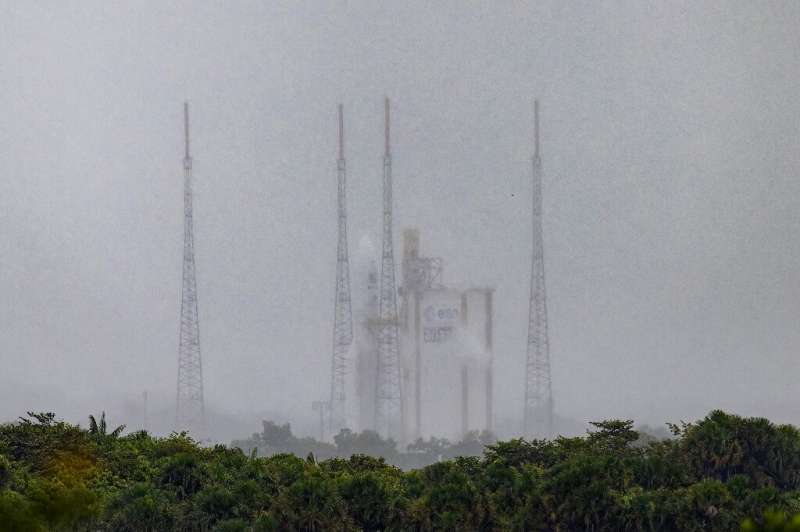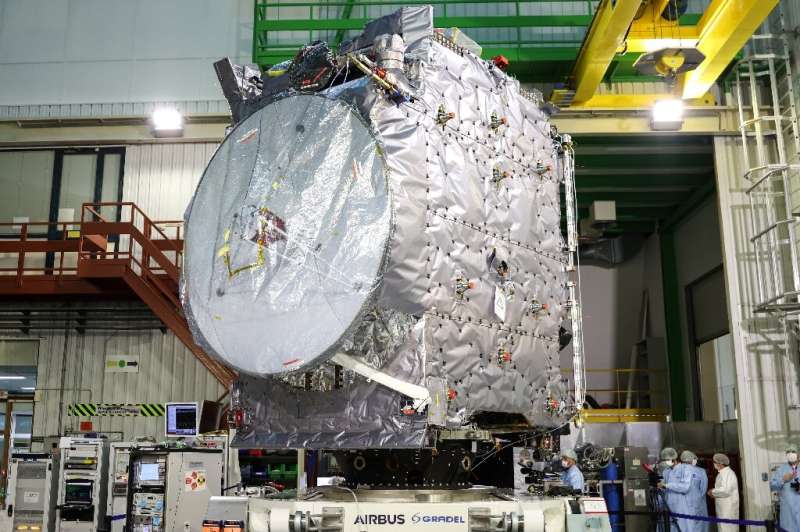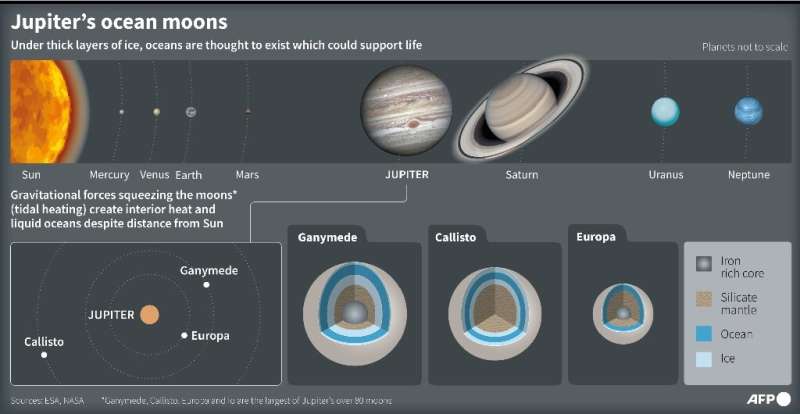This article has been reviewed according to Science X's editorial process and policies. Editors have highlighted the following attributes while ensuring the content's credibility:
fact-checked
reputable news agency
proofread
Europe's Jupiter probe set for new launch attempt

The European Space Agency's JUICE mission to explore Jupiter's icy, ocean-bearing moons will again try to blast off on Friday, a day after the first launch attempt was called off due to the threat of lightning.
The spacecraft is scheduled to launch on an Ariane 5 rocket from Europe's spaceport in Kourou, French Guiana at 1214 GMT, 30 seconds earlier than Thursday's aborted effort.
If successful, the uncrewed, six-tonne spacecraft will embark on an eight-year journey through the Solar System aiming to discover whether Jupiter's moons are capable of hosting extraterrestrial life in the vast oceans hidden under their ice-covered shells.
Thursday's launch was called off just minutes before the countdown was set to begin, disappointing those gathered in the Jupiter control room in Kourou, including Belgium's King Philippe.
Stephane Israel, the CEO of French firm Arianespace which provided the Ariane 5 rocket, told AFP that "a large mass of clouds approached and we absolutely could not proceed with the launch due to the risk of lightning".
On Friday, the threat of lightning will be monitored "until the last moment," he added.
The European Space Agency tweeted that Friday's launch has received the green light for fuelling, and the "weather looks good (so far)".

"Shall we try again?" it added.
The JUpiter ICy Moons Explorer (JUICE) plans to take a long and winding path to the gas giant, which is some 628 million kilometers (390 million miles) from Earth.
It will use several gravitational boosts along the way, first by doing a fly-by of Earth and the Moon, then by slingshotting around Venus in 2025 before swinging past Earth again in 2029.
When the probe finally arrives at Jupiter in July 2031, it will need to carefully hit the brakes to enter the gas giant's orbit.
From there, it will focus on Jupiter and its three icy moons Europa, Ganymede and Callisto.
Liquid water ocean
The moons were first discovered by astronomer Galileo Galilei more than 400 years ago, but were long ignored as potential candidates for hosting life.
However, the discovery of huge oceans of liquid water—the main ingredient for life as we know it—kilometers beneath their icy shells has made Ganymede and Europa prime candidates to potentially host life in our celestial backyard.

JUICE will set its sights on Ganymede, the Solar System's largest moon and the only one that has its own magnetic field, which protects it from radiation.
In 2034, JUICE will slide into Ganymede's orbit, the first time a spacecraft will have done so around a moon other than our own.
The mission will not be able to directly detect the existence of alien life, but instead aims to establish whether the moons have the right conditions to harbor life.

The delayed launch of the 1.6 billion-euro ($1.7 billion) mission comes during a crisis for European space efforts, after Russia pulled its Soyuz rockets in response to sanctions over the war in Ukraine.
Combined with repeated delays to the next generation Ariane 6 rockets and the failure of Vega-C's first commercial flight last year, Europe has been struggling to launch its missions into space.
JUICE is expected be the second-last launch for Ariane 5 before it is replaced by the Ariane 6.
© 2023 AFP





















